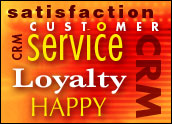
Designing effective marketing campaigns and finding the right marketing mix are primary concerns for any online retailer. They are especially important for startups and small to medium-sized businesses (SMBs) competing with larger and better established e-tailers, as well as the rapidly growing number of their SMB peers.
Creating marketing campaigns and finding the right channels is a process of continual experimentation and refinement. It also entails building up an expert’s store of knowledge about your customers, products, markets and suppliers, as well as how to make use of analytical tools and data feeds to capitalize on them.
This in turn means that startup e-tailers need to roll up their sleeves and get close and personal with all the raw data that an online retail business generates and the various data collection, analysis and automated marketing tools and methods on offer.
Automating Marketing: The Basics
Efforts aimed at automating marketing, according to MerchantAdvantage’s Michael Lambert, can basically be divided into two categories: automating marketing efforts while maintaining control and responsibility for them, and hiring a third-party to manage and handle various marketing efforts on an e-tailer’s behalf.
E-tailers can also mix-and-match to some degree, Lambert told CRM Buyer, by having third-parties take care of things like search engine optimization and search engine marketing while handling others, such as comparison shopping engines, themselves or vice-versa.
“MerchantAdvantage has built their tools to allow the merchant or their designee to manipulate their marketing efforts based on their superior product knowledge and their understanding of their own product lines and marketing goals,” he explained.
“We feel the marketing power should be placed in the hands of the merchant, and more specifically, the marketing director — not the IT person, who has her own management issues with which to deal. The trade off, oddly enough, is that the method which provides the most power costs the least. By handling the marketing decisions first person — as you actually still make the decisions in both scenarios — you control all of the aspects of the marketing endeavors while paying significantly less money.”
Means and Methods
“Marketing is critical,” for e-tail startups, yet most and small businesses “do very little e-marketing because most do not know where and how to start,” FastCommerce.com CEO Charles Han told CRM Buyer.
Basic e-marketing, Han explained, consists of the following methods:
- Search marketing, both organic and paid
- E-mail marketing
- E-marketing through data feeds
- E-marketing through affiliate programs
A variety of efficient online marketing tools are also available to start-up and SMB e-tailers, added VevoCart director Vince Pichpongsa. These include:
- Product feeds for shopping comparison engines such as Bizrate, Dealtime and Google Base
- Pay per click advertisements, mainly in search engine such as Google and Yahoo
- Pay-per-sale networks where merchants may join affiliate networks such as Commission Junction and Share-A-Sale
- Banner advertisements on large Web sites with audiences that their own customers tend to visit regularly
- Reseller and other programs that offer discounts for returning customers.
Using Affiliates to Increase the E-Marketing Curve
Most small e-tailers do not have extensive marketing departments, said Affect Strategies’ President Sandra Fathi. “They cannot hire a seasoned expert for every task, nor should they. However, there [are] plenty of tools and programs that help automate processes to make their marketing programs more efficient and their employees more productive.”
For instance, creating an affiliate program can be a time-consuming endeavor. However, companies such as Commission Junction (CJ) offer online merchants an automated platform through which they can publish marketing programs and leverage the online presence of large numbers of affiliated e-tailers, Fathi explained.
“Inside of 30 days, a store can have 1,000 affiliates. Since CJ manages the financial relationship with the affiliates, the e-tailer only needs to cut one check, to CJ, who handles the disbursements. In addition, this type of program enables e-tailers to set the compensation level they would like to provide, such as 6 percent commission on all sales. Therefore, e-tailers only pay commission on actual sales rather than pay-per-click or views,” Fathi told CRM Buyer.
Tapping Online Marketing Expertise
“To be very up front and honest, it can take a great deal of effort for a merchant to maintain their own marketing efforts. And often in doing so, other aspects of their operations can suffer. By automating, even to a small degree, a merchant can focus on human matters and allow computers to do the tedious work,” Lambert said.
MerchantAdvantage clients typically devote a reasonable amount of time deciding which marketing channels they want to use, Lambert related as an example. Then they use tools such as MerchantAdvantage’s Channel Wizard to sign up and configure the appropriate data feeds for those particular channels. With the feeds and programs up and running, they review each channel and program’s performance to see what’s going right and wrong.
“This then becomes automated, allowing a merchant to review performance reports whenever they wish or can, and simply make adjustments to the existing automated procedure. The continuous refining process allows merchants’ marketing campaigns to become more efficient, effective and economic while the automation allows a merchant to forget about the processes until they are good and ready to address them again,” Lambert elaborated.





















































Social CRM
See all Social CRM